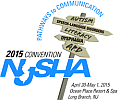Effect of Text Messaging on Auditory Localization Among Young Adults
Thursday, 11:00am to 1:00pm
Seabright
Poster 1
Researchers have established that the ability to level and type of cognitive load of a distractor will affect primary task performance to varying degrees. Distractors with high-cognitive load (e.g. texting) can significantly impair primary task performance. However, there is a gap in the literature regarding the influence of texting on auditory tasks. An important auditory task is the ability to localize, which can significantly affect safety. Previous research discusses the effects of noise on localization abilities; however, to date no studies have examined the effects of noise and a simultaneous distractor, such as texting, on localization performance. The purpose of this study was to determine whether texting could distract the listener and affect the ability to localize meaningful auditory stimuli. Fifteen young adults with normal hearing were seated in the center of an eight-speaker array from which common environmental sounds were presented. Listeners were asked to identify the speaker number from which the target signal was presented in four listening conditions alternating quiet and noise and texting and no texting. During noise conditions, traffic noise was presented from four different speakers. RMS error in degrees was calculated for each listening condition. The presence of noise (and texting) was found to significantly decrease localization performance. Additionally, the type of target signal was also found to significantly impact performance. The results of this study did not support the hypothesis that text messaging has a significant effect on localization accuracy and safety. However, the presence of noise was found to be significant.
Track:
Audiology
